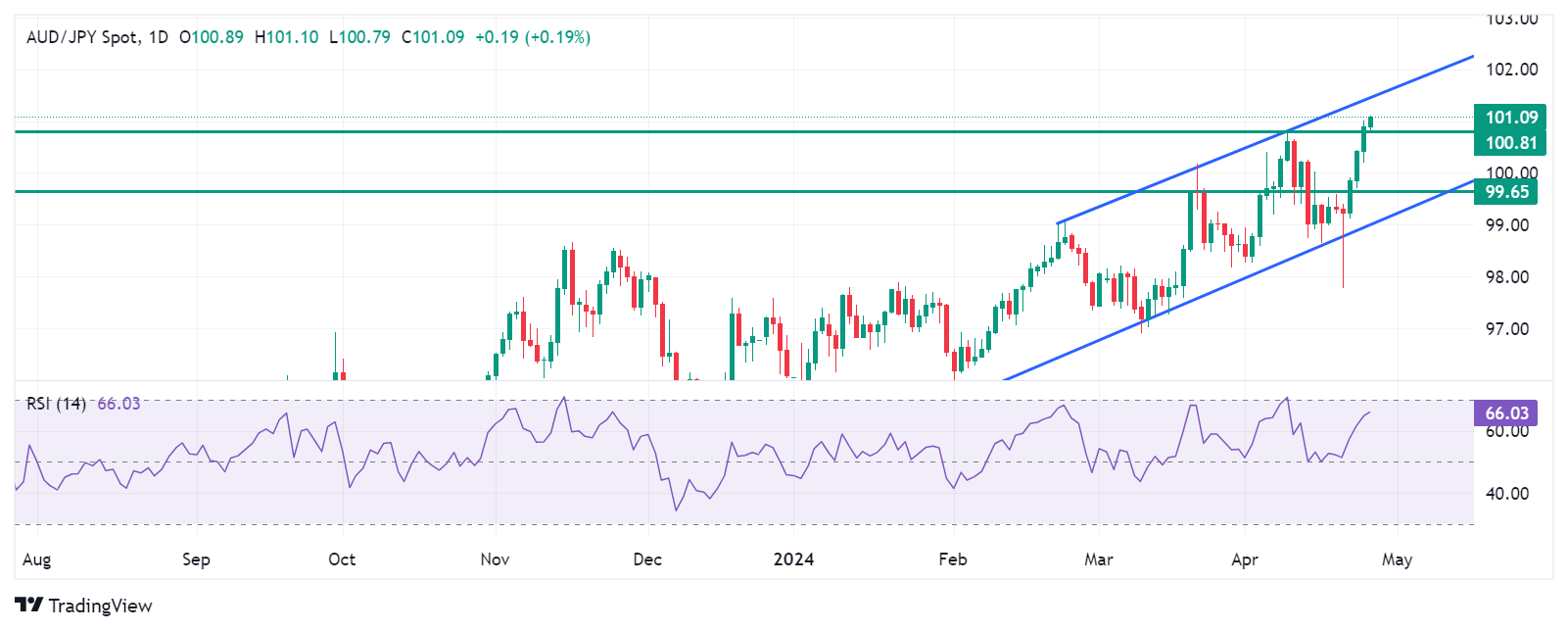AUD/JPY rises amid weaker Yen, eyes on BoJ’s policy decision
- AUD/JPY continues its winning streak after the stronger Australian CPI was released on Wednesday.
- Australia’s 10-year government bond yield has surged to 4.49% near five-month highs on waning expectations of the RBA rate cuts.
- The Japanese Yen continues to depreciate as the BoJ is expected to abstain from implementing rate hikes on Friday.
AUD/JPY edges higher for the fourth consecutive session on Thursday. The Australian Dollar (AUD) found support following the release of Australian Consumer Price Index (CPI) data on Wednesday, which exceeded expectations. This development hints at a potentially hawkish stance for the Reserve Bank of Australia’s (RBA) monetary policy, bolstering the AUD and subsequently supporting the AUD/JPY pair.
Australia’s 10-year government bond yield has surged above 4.49%, nearing five-month highs, as robust domestic inflation figures have strengthened expectations of the RBA delaying interest rate cuts. Moreover, easing tensions in the Middle East has fostered a positive market sentiment, benefiting risk-sensitive currencies like the AUD.
The Japanese Yen (JPY) continues to depreciate ahead of the upcoming release of the Bank of Japan’s (BoJ) Monetary Policy Statement scheduled for Friday. It’s widely anticipated that the BoJ will abstain from implementing rate hikes in this meeting.
According to reports from Nikkei, the BoJ is likely to deliberate on the “impact of accelerating Yen depreciation,” indicating that the central bank may intervene in the foreign exchange markets if the JPY weakens.
Daily Digest Market Movers: AUD/JPY appreciates on hawkish sentiment surrounding RBA
- According to Luci Ellis, Westpac’s chief economist and former Assistant Governor (Economic) at the Reserve Bank of Australia, inflation slightly surpassed expectations in the March quarter. They anticipate the Board will maintain interest rates in May and have revised the projected date for the initial rate reduction from September to November this year.
- According to analysts at Barrenjoey Capital Partners, a leading Australian investment banking firm, advised to utilize the trimmed mean to rank Australia’s inflation. Australia’s six-month annualized rate of trimmed mean inflation, standing at 3.6%, is notably the highest worldwide, surpassing even the United States’ 3.2% six-month annualized rate of trimmed mean inflation.
- Australia’s Consumer Price Index (CPI) rose by 1.0% QoQ in the first quarter of 2024, against the expected 0.8% and 0.6% prior. CPI (YoY) increased by 3.6% compared to the forecast of 3.4% for Q1 and 4.1% prior.
- Australia’s Monthly Consumer Price Index (YoY) rose by 3.5% in March, against the market expectations and the previous reading of 3.4%.
- On Tuesday, Australia’s Judo Bank Composite Purchasing Managers Index (PMI) surged to a 24-month high, indicating an improvement from the previous month. While the Manufacturing PMI reached an eight-month high, the Services PMI declined to a two-month low. This has bolstered the hawkish sentiment for the RBA’s stance on its interest rate trajectory.
- According to the Japan Times, the proportion of Japanese companies intending to increase their pay scales reached 70.7%, marking a rise of 6.3 percentage points from the previous year. Additionally, the number of companies planning to implement pay-scale hikes and regular pay increases totaling 5% or more amounted to 36.5%, nearly doubling from the previous year. This could provide support for the Yen.
- Reuters reported that Bank of Japan (BoJ) Governor Kazuo Ueda reiterated on Tuesday that the central bank would raise interest rates again if trend inflation accelerates toward its 2% target, in line with its forecast. Ueda also said that it is hard to predict in advance the ideal timeframe for the Bank of Japan (BoJ) to gather sufficient data before considering a policy change.
- The Tokyo Consumer Price Index (CPI) for the year ended April is scheduled to be released during the early Friday session in Japan.
Technical Analysis: AUD/JPY moves above the psychological level of 101.00
The AUD/JPY trades around 101.10 on Thursday, edging towards the upper boundary of the daily ascending channel after surpassing April’s high of 100.81. Moreover, the 14-day Relative Strength Index (RSI) is trending above the 50-level, backing the bullish sentiment. The immediate resistance is seen at the major level of 101.50.
In case of a downside movement, immediate support for the AUD/JPY pair could be found at the psychological level of 101.00. A breach below this level might lead to a further decline toward the psychological level of 100.00, followed by the support level of 99.65 and the lower boundary of the ascending channel around the level of 99.00.
AUD/JPY: Daily Chart
Japanese Yen price today
The table below shows the percentage change of Japanese Yen (JPY) against listed major currencies today. Japanese Yen was the weakest against the Australian Dollar.
| USD | EUR | GBP | CAD | AUD | JPY | NZD | CHF | |
| USD | -0.12% | -0.11% | -0.11% | -0.23% | 0.26% | -0.15% | -0.05% | |
| EUR | 0.12% | 0.02% | 0.02% | -0.11% | 0.37% | -0.03% | 0.07% | |
| GBP | 0.11% | -0.02% | 0.00% | -0.13% | 0.35% | -0.06% | 0.05% | |
| CAD | 0.12% | -0.01% | 0.01% | -0.12% | 0.35% | -0.03% | 0.05% | |
| AUD | 0.23% | 0.12% | 0.13% | 0.13% | 0.48% | 0.08% | 0.18% | |
| JPY | -0.24% | -0.36% | -0.35% | -0.36% | -0.46% | -0.41% | -0.32% | |
| NZD | 0.15% | 0.03% | 0.04% | 0.03% | -0.09% | 0.40% | 0.13% | |
| CHF | 0.05% | -0.07% | -0.05% | -0.06% | -0.18% | 0.32% | -0.10% |
The heat map shows percentage changes of major currencies against each other. The base currency is picked from the left column, while the quote currency is picked from the top row. For example, if you pick the Euro from the left column and move along the horizontal line to the Japanese Yen, the percentage change displayed in the box will represent EUR (base)/JPY (quote).
Economic Indicator
BoJ Interest Rate Decision
The Bank of Japan (BoJ) announces its interest rate decision after each of the Bank’s eight scheduled annual meetings. Generally, if the BoJ is hawkish about the inflationary outlook of the economy and raises interest rates it is bullish for the Japanese Yen (JPY). Likewise, if the BoJ has a dovish view on the Japanese economy and keeps interest rates unchanged, or cuts them, it is usually bearish for JPY.
Next release: Fri Apr 26, 2024 03:00
Frequency: Irregular
Consensus: 0.1%
Previous: 0%
Source: Bank of Japan


